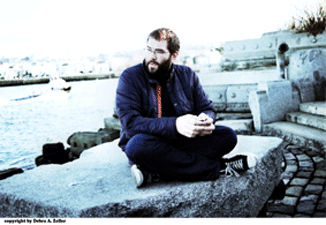No longer uptodate!
After nearly 15 years, this website is being decommissioned. For a while, this old version will still be reachable, but it will no longer show reliable information about events at ausland,
The new version of our website can be found here: https://ausland.berlin
casiotone + dead science
24 Oct 2006 - 21:30

*** eiskalt ***
presentent:
casiotone for the painfully alone (tomlab, USA)
the dead science (absolutely kosher, USA)
plus the goldmunds dj team
The name of Owen Ashworth's one-man band, Casiotone for the Painfully Alone, lets you know you're in for some melancholy bedroom pop played on bargain synths. But what it doesn't convey is just how well Ashworth's song succeed in making depression sound alluring. His lyrics owe a huge debt to the Smiths, and he knows it--on his most recent album, Twinkle Echo , he turned their kicky "Sheila Take a Bow" into the despondent (if still satirical) "Toby Take a Bow." But Ashworth does Morrissey proud: empathetic portrait-songs like "Roberta C." move lightly from generic characterizations ("Listless intellectual / In her prime") to well-chosen details ("Scrabble high score 409 / With a note on the bed") before fanning back out to the univesal ("Saying 'True love is hard to find'"). There are hints of the Magnetic Fields as well--adenoidal voice and all--but where Stephin Merritt favors smooth arrangements, Ashworth likes to pair angular, spiky rhythms with thick chords held so long they begin to oppress. It's disorienting at first, but soon the warm, conventional progressions unfold over your sore ole heard like a heavy quilt. "Young Shields," the single that heralds the soon-to-be-released fourth Casiotone album, might be a tad more polished--I think i hear a real cymbal--but the lovely narratives and patina of fuzz remain.
Chicago Reader November 11, 2005
Fans and critics alike get it twisted when pressed to describe moody Seattle trio the Dead Science. Local rag Earshot Jazz Monthly once likened the pipes of singer/guitarist (and occasional Stranger contributor) Sam Mickens to cool-school crooner Chet Baker, and Jherek Bischoff plays an upright bass. On the other hand they rarely rehearse, share close ties to experimental outfits Xiu Xiu and Yellow Swans, and are more likely to play gallery spaces than conventional rock clubs. So what are the Dead Science? A jazz combo? An arty improv ensemble?
..
"Jherek and I had been in lots of experimental free-jazz bands when we met," recalls Mickens. Although they arrived at the decision independently, they shared the same concept when they formed the group in 2000. "Both of us wanted to start a pop band," the singer continues. "We even had some ridiculous idea of what our specific components were, Talking Heads–meet–Tom Waits... some bullshit like that. It didn't turn out like that at all."
"Last Return," the opening track of Frost Giant, offers a prime example of how the Dead Science subvert traditions to riveting effect. While Nick Tamburro's drums turn lopsided somersaults, Bischoff propels the melody; the steadiest instrument, rhythmically, is the guitar. "Totally the opposite of a regular rock band," says Mickens. For all the push and pull in the dynamics between the three players, and their integration of subtle textures, their compositions typically "start from a really basic songwriting place, then get altered through playing."
What about Mickens's delirious, upper-register vocals, which impart selections like "In the Hospital" with an unsettling, feverish quality? Surely such unearthly singing is completely at odds with mainstream tastes. Wrong again. "In the past couple of years, I've just been listening mostly to Prince and Michael Jackson," he reveals. "Way more than anything else. And that has definitely had a big effect on my singing."
Prince and Jackson provide ideal reference points for the band's overall aesthetic, too. "Some of the most interesting music is completely alien in its content, but still has this immediate pop feeling," the singer continues. "There has always been stuff like that, but it seems, with acts like Outkast, there's more and more now."
..
"The stuff that interests me the most, to play and listen to, is the absolute weirdest music possible that still has that pop element," adds Bischoff. "Like Deerhoof. Most of the time, their sound is really disjointed, but every once in a while, they hit a chorus, and go megapop for a moment... and then that flies out the window again. A lot of it has to do with trying to take the framework of pop, make it as interesting as possible, but still keep it dramatic and concise. I don't know if we actually, consciously, try to fuck it up, but it does come out weird that way."
Far from holding the Dead Science back, simple forms like song structure and a three-piece lineup, combined with the players' backgrounds in experimental and improvised music, continues to give them more freedom. "As the band has developed, our music is feeling continuously more exciting," concludes Mickens. There is more room in the new songs to completely alter them in the moment. To not just perform the songs, but let how you're feeling determine how you play them." If that basic impulse—to communicate something emotional via music—isn't the essence of pop, what is?
The Stranger, Seattle
